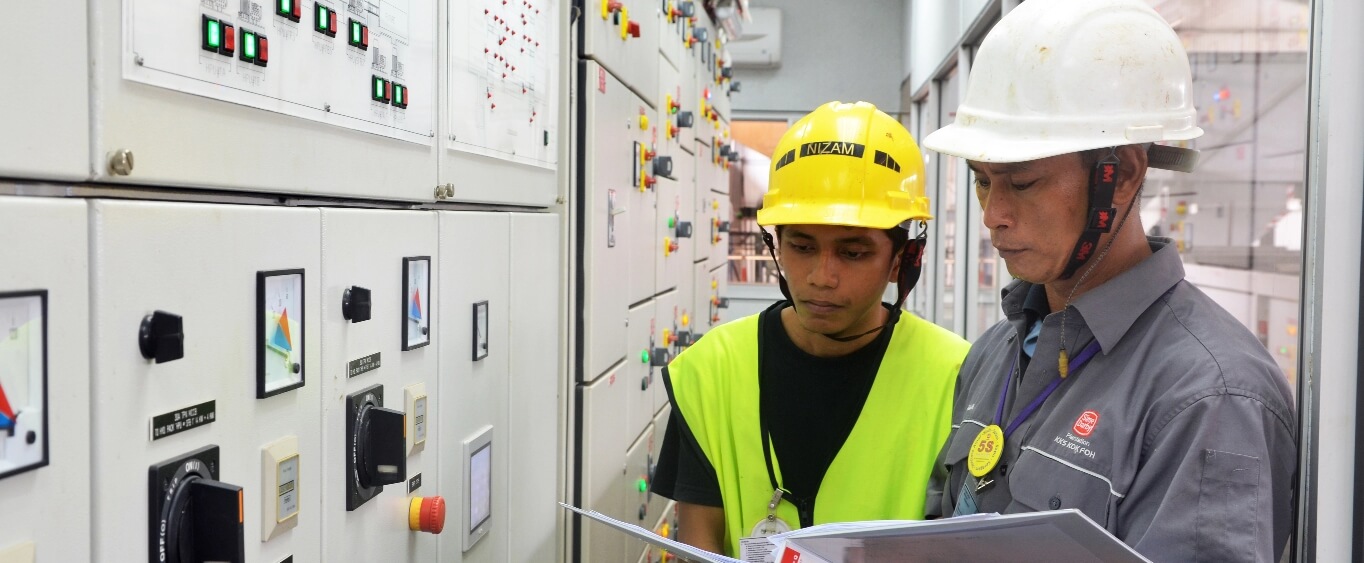Operational Efficiency


OVERVIEW
Operating plantations, mills and refineries in the agricultural sector is resource-intensive.
SDP recognises our dependence on natural resources and continuously strives to do more with less. Efficiently managing waste and our shared natural resources is crucial to ensuring efficient and sustainable operations.
Water management
[GRI 3-3, 303-1, 303-5]Water is essential for our operations, but we are cognisant that it is a shared and finite global resource. We continuously monitor and strive to reduce our water usage by improving the efficiency of our operations and by maintaining the quality and availability of surface water and groundwater for our business and surrounding communities, amongst other measures.
We draw surface water and groundwater at our plantations and mills for industrial uses, like steam generation, pesticide-mixing, seedling irrigation, and domestic uses, such as cleaning and cooking. Our downstream operations purchase water from municipal water utility companies for its processes.
All our upstream operations monitor the amount of water used and its intensity. In 2021, we consumed a combined 16.9 million cubic metres (m3) of water across all operations.
Each region primarily determines its water management and monitoring approaches according to regulatory requirements. Water data is collected at the site level and may vary from operation to operation. We are currently reviewing our internal processes to collect this data at the Group level, as doing so will ensure consistency and comparability. Whilst we previously reported a Group-level water-usage-intensity reduction target, we will revisit this approach once our collection processes are streamlined.
We will explore conducting a full water footprint assessment at our operations in line with the Water Footprint Network methodology, and a life cycle assessment in line with the ISO 14046 standard. We will then use these simultaneous assessments to develop SDP’s water footprint framework in 2022. In November 2021, we trained the responsible SDP teams in Malaysia in partnership with the Centre for Environmental Sustainability and Water Security (IPASA), Universiti Teknologi Malaysia (UTM).
Water consumed 2019–2021 (m3)
| Region | 2019 | 2020 | 2021 |
| Malaysia | 5,882,033 | 5,019,912 | 5,041,094 |
| Indonesia | 5,815,325 | 5,178,317 | 5,111,737 |
| PNG and Solomon Islands | 13,453,031 | 11,450,386 | 6,767,853 |
| Total | 25,150,389 | 21,648,615 | 16,920,684 |
Notes:
1. Water consumption is calculated by subtracting total water discharged from total water withdrawn.
2. There is a significant reduction in PNG and Solomon Islands number in 2021 as a result of minimal irrigation used in Ramu Agri Industries (RAI) in 2021, compared to 2019 and 2020. In 2020 there was a large reliance on irrigation during the drier months.
3. Malaysian data excludes figures from KKS Tanah Merah and Sua Betong mills due to unavailabilit
Average water usage intensity by region 2019–2021 (m3/MT FFB)
| Region | 2019 | 2020 | 2021 |
| Malaysia | 1.32 | 1.41 | 1.53 |
| Indonesia | 1.74 | 1.75 | 1.60 |
| PNG and Solomon Islands | 0.97 | 1.16 | 1.16 |
Note: Malaysian data excludes figures from KKS Tanah Merah and Sua Betong mills due to unavailability.
Minimising and Treating Effluent
[GRI 3-3, 303-2]Operating near waterways, SDP has a responsibility to protect water sources within and around the boundaries of our operations.
Palm oil mill effluent (POME) is wastewater produced from FFB processing. It is mainly organic and biologically treated through anaerobic digestion, and what is not used as fertiliser for plantations is treated prior to being discharged to waterways to the prescribed legal requirements.
Palm oil refinery effluent (PORE) is wastewater from the refining of crude palm oil (CPO). PORE treatment usually involves a chemical process to remove oil, grease and inorganic substances before further biological treatment prior to its discharge. Our robust management systems ensure all our mills and refinery operations are fitted with Palm Oil Mill Effluent Treatment System (POMETS) and Industrial Effluent Treatment Systems (IETS) that support the management of waste and comply with national environmental standards.
We continuously monitor the quality of discharged wastewater and wastewater treatment performance at our upstream operations. We also ensure that biological oxygen demand (BOD) remains below regulatory thresholds. We have set targets for effluent intensity for each of the regions where we operate. These are 0.65 cubic metres POME per tonne of FFB processed (m3/MT FFB) for Malaysia, 0.5 m3/MT FFB in Indonesia, and 0.7 m3/MT FFB for PNG and Solomon Islands. Our effluent intensity levels remained below these thresholds in 2020 and 2021.
Providing access to safe drinking water and sanitation to our employees is a top priority. We test water samples at regular intervals, and samples taken from river systems have shown no significant water quality deterioration.
Note: Malaysian data excludes figures from KKS Tanah Merah and Sua Betong, Negeri Sembilan due to unavailability.
Waste management
[GRI 3-3, 306-1, 306-2, 306-3, 306-5]We strive to minimise the amount of waste and by-products produced by our operations and are committed to reusing and recycling as much as possible. SDP follows best practices for by-product management at our upstream palm oil facilities and seeks to recover and reuse all the by-products we generate. Solid organic by-products from our production processes include empty fruit bunches (EFB), mesocarp fibre and palm kernel shells, which are recycled as fuel and composted or mulched as organic fertiliser. Liquid organic by-products, or POME, contain residual nutrients that can be treated and applied as land fertiliser.
We dispose of our downstream inorganic waste at municipal landfills or using incinerators. Hazardous waste is collected for proper disposal by authorised third parties. All scheduled waste is monitored and tracked according to each region’s regulatory requirements.
Our Indonesian operations, Minamas, are enrolled in PROPER (Program for Pollution Control, Evaluation, and Rating), a mandatory environmental information disclosure initiative overseen by the Indonesian Ministry of Environment and Forestry. The programme uses a rating system to assess water and air pollution control, hazardous waste management and environmental impact. In 2020, 16 of our mills in Indonesia received blue rating, and 17 of our mills in Indonesia received Blue Rating of PROPER Awards. A PROPER rating serves to promote compliance within existing regulations and rewards companies whose performance exceeds regulatory standards.
Agro-chemical management
[3-3]We use agrochemicals to protect our crops against diseases and pests and maintain high yields at our agricultural operations. However, we aim to minimise the use of chemicals, including pesticides and chemical fertilisers. Our use of chemicals is guided by a management plan that implements appropriate SOPs to eliminate exposure to hazardous chemicals for workers, communities, and the environment. We do not use WHO Class 1A and 1B chemicals or those listed in the Stockholm or Rotterdam Conventions and the FSC Highly Hazardous list. We also avoid bio-accumulative or persistent pesticides. (Please refer to our website for the full list of our fertiliser usage.)

Instead, we have implemented an integrated pest management (IPM) approach that combines cultural, mechanical, biological, and chemical strategies to control pests across all our plantations. Our approach includes housing barn owls at estates to naturally hunt and manage the rat population in oil palm plantations, using fungi to formulate a bio-pesticide that controls the Rhinoceros Beetle pest population and cultivating beneficial plants at the fringes of palm rows around our estates to attract parasitoid insects - the natural predators that feed on bagworms.
See our website for more details on our eco-solutions
